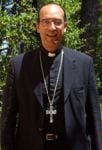He hesitated for a moment before agreeing to the interview request. A form of embarrassment that certainly does not stem from a denial of nature or the effects of the papal decision. If he did not wish to “add his outcry,” a phrase he admits does not necessarily suit a representative of the Church, it is rather because of a feeling of deep and unshakable inner conviction: “What sense would it make to say that the sun rises in the morning?” he says before clarifying to be sure he is understood: “Do we really need to explain that Williamson’s remarks”—he refuses to grant him the title of Monsignor—”are pathological?” The tone is set.
With an unflappable coolness marked by irony, for which he is now famously known, Monsignor Sankalé offers to provide an explanation that is both theological and filled with humanity… and somewhat committed.
He observes that the decision of the Holy Father to lift the excommunication leads to a “canonical aberration”: “Canonically, he’s a bishop without a diocese, pending regularization,” perhaps in anticipation, according to him, of a “personal prelature” of Benedict XVI. Eager to readdress the issue from the start, he confesses to having been “shocked by four things.” Firstly, he points out, the fact that this “lifting” concerns “four whites, pure juice.” “This indicates something,” he adds almost dismissively. He then recalls, with significant details, a story about Monsignor Lefebvre, serving in the early sixties in a “newly independent Senegal” where the prelate had already been involved in a controversy under identical circumstances: “he had traveled,” recounts Monsignor Sankalé, “to Canada for his missionary congregation” and had uttered to a journalist some “unacceptable formulas about African independence,” particularly the notion that “Africa had no elites capable of leading it.” This had resulted at the time in “expulsion by President Léopold Sédar Senghor and his assignment to Tulle.” “I did not read the entirety of Williamson’s interview,” continues the bishop of Nice, wondering what he could have answered “had he been questioned about the slave trade.” Before continuing with a tone of contained anger: “How then did he react to the acts of repentance by John Paul II concerning the Holocaust?” “The fourth thing that shocked me,” he specifies, is the statement by Monsignor Fellay attempting to distance himself… weakly,” according to Louis Sankalé, for whom “the superior of the Society of Saint Pius X worsens his case by having explained that he regretted the journalist had approached a ‘contested’ subject.”
“I do not believe, in the sense of a Creed,” the Bishop insists, “that one can be Catholic and revisionist and anti-Semitic at the same time… nor even anything else that targets humans.” “A Catholic cannot be anti-something, or else he must be anti-anything that wounds and humiliates humanity.”
He offers his personal insight on the Pope’s decision: “I think he did not know.” “I cannot imagine that Benedict XVI knew and did it anyway,” while noting “at the same time, it could not be ignored within the Vatican that the Lefebvrist environment rooted its origins in politically notorious families.” And he recalls that “Monsignor Lefebvre had participated in all the sessions of Vatican Council II where he had systematically opposed all the decisions made.”
The bishop of Nice attempts a psychological approach to Benedict XVI’s gesture: “He’s an old man who remains obsessed with achieving reconciliation before his death.” “In this sense, he is not concerned with political expediency.” He is “Ratzinger formatted” and “feels invested with a mission before leaving the seat of Peter.” He has often explained, reports Louis Sankalé, that the “schisms that hurt the unity of the church were initially just minor rifts and that if they had been resolved at the source, we would not be where we are now.” When asked about papal infallibility and the fact that Benedict XVI’s decision challenges an a priori infallible decision of his predecessor John Paul II, he replies immediately: “papal infallibility concerns faith and morals.” “It does not prevent the Pope from missing a step as he goes from one of his apartments to another in the Vatican!”
“Look at Jesus Christ,” he suddenly says as if speaking to himself. “Faith consists of calling man to rise when he falls,” a phrase to be taken as an inner respite. A merciful tone after comments that might seem like a veiled sentence. In any case, a pause before continuing the interview.
“This reconciliation,” he continues, “is a task to which Benedict XVI pays particular attention.” And to mention the existence of a “working group of Parisian priests in liaison with Rome on the excommunication that struck Luther.” “An excommunication that at the time targeted theses that were not as anti-Catholic as believed at the time.” “When by the way,” also wonders the prelate of Nice, “will there be a diocese for Monsignor Gaillot?” But even a diocese for this bishop of Partenia would not, according to him, solve the “Williamson problem.” “Nothing, in fact, could counterbalance it.” In this sense, he specifies, “public opinion is so mobilized on this question that the latest reflections of the Bishops of France on bioethics are likely to go unnoticed.” “Just like the next Social Encyclical being prepared at the Vatican,” which could in this climate “become difficult to receive.”
Monsignor Sankalé admits having received several letters from parishioners outraged by the decision of the Sovereign Pontiff. Letters to which he responded by expressing his feeling “of disgust, shame, and determination.” A determination he intends to illustrate by showing “great vigilance towards the Community of priests and seminarians in training in his diocese.” Behind the serenity of tone, the man of conviction ultimately resurfaces: whatever the perils underway and likely to threaten the cohesion of the “Father’s house,” his seems apparently well-guarded.


